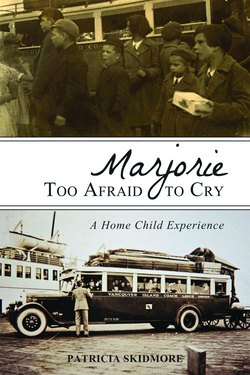Читать книгу Marjorie Too Afraid to Cry - Patricia Skidmore - Страница 11
На сайте Литреса книга снята с продажи.
Four
ОглавлениеWinifred’s Sorrow
Where are my children?
I want them home!
Where are you taking them?
They must feel so alone.
February 8–9, 1937
Winifred felt the eyes of her children glued to her as the train pulled away. The brave face she worked so hard to keep fell to pieces once the door shut after them. When the train pulled away, it wrenched something deep inside of her and the tears followed fast and furiously. She did not want her children to see her like this. She had been holding herself together for days, fighting to curb the growing feeling of defeat. For the sake of her remaining three children, she had to find the strength to continue. If they took them away too, then there would be no point — no fight left in her. She tried to be brave so they could remember her that way. Lord knows, they would need to be brave.
Winifred watched the train disappear. In her heart of hearts she felt it was the last time she would ever see these four. It was bad enough when they took her older sons. No one told her the worst was yet to come. At least she had a chance of seeing her boys again. Fred and Norman were in the country somewhere, but these four would not be staying in England. She tried to find a way to explain to her little children what was going to happen to them. But it was beyond her understanding why her country would ship young children so far away. She had struggled over the past week for the right words, the right time, but when she started, she faltered. The words stuck in her throat. She was a coward, afraid of what her own failure would look like in their eyes. In the end, she thought it was best not to tell them, that way she could pretend it was just a nightmare, at least until they left.
Winifred stood on the platform and tried to see the purpose of everything. The horrid man told her that the children would stay in Newcastle for a day or two, and then they would send them to the Middlemore Emigration Home in Selly Oak on the outskirts of Birmingham. She wrote that down right away, not wanting to lose track of where they were. Birmingham was so far away. She would never be able to visit them. She wanted to smack that man when he told her that it was men like John Middlemore that made this country great. He told her Middlemore’s first home for children had opened in 1872 and they had been emigrating children of the poor ever since. He told her that Middlemore Homes now worked closely with the Fairbridge Society and assured her that Kingsley Fairbridge’s plan was sound. He opened a book and read from it:
Every year tens of thousands of boys and girls seek admission to the labour market only to be told that there is no need of them, and they are flung back on to one or other of the great human scrap-heaps which lie at the gates of every one of our great cities — derelict little vessels on the Ocean of Life, children doomed to a blind alley existence and the squalor of the slums.[1]
He said her children would go “from these slums to sunshine.” The man was daft. Obviously, he had never seen her children play in the sun down on the Whitley Bay sands — a site to gladden any mother’s heart with its fresh air, sea breeze, sun, and sand. Her children had all the ingredients for a healthy life; she just needed a little more help from her husband. That damn letter — that was not the kind of help she needed.
The Prince of Wales is featured in this Fairbridge Society appeal for funding, which appeared in the The Times on March 11, 1925. This funding was to provide “for intensive training of 200 happy little embryo Empire builders.”
Online newspapers, 17th to 18th century, Burney Collection, Newspapers, Gale Group.
A Christmas Charities poster that appeared in The Times, December 14, 1931.
Winifred could have strangled that wretched man too, when he told her, “Your children are being given a chance.” His lip curled as he continued. “Children like yours have no future here. The country has no need of all this flotsam and jetsam. It is the best thing for the children, your family, and the entire country. Do your duty, woman.”
It is not our fault that we are poor, she thought, her frustration growing by the moment. There are no jobs. Maybe they would have a better chance; there was little work around here for their men, let alone their children. That was her only hope, that he might be right. Will they keep their promise and send her information on where she can write to them? Would the Fairbridge Society send her children to Canada or to Australia?[2]
